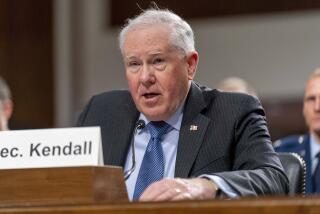Ashcroft Plans Stiff Punishment for Those Who Leak Secrets
- Share via
WASHINGTON -- Atty. Gen. John Ashcroft said Wednesday he plans a new and more aggressive effort to punish those who leak national security secrets, but he told Congress he does not need new legislation to do so.
“Detecting and punishing unauthorized disclosures of U.S. national security secrets [is] among our highest priorities, at all times, but especially in this time of war against terrorism of global reach,” Ashcroft said in a letter to leaders of the House and Senate.
To deter leaks, Ashcroft said government employees who handle classified information will be obliged to sign nondisclosure agreements that expose them to financial penalties and perjury charges if they are caught divulging secrets.
“This will send a signal that if they knowingly leak, there will be consequences,” a Justice Department spokesman said.
Large numbers of government employees already are required to sign routine nondisclosure forms, but there is no effective penalty for violators, the spokesman said.
By law, the government can bring criminal charges against someone who divulges a secret that damages national security. However, prosecuting such a case in a public trial puts a spotlight on information the government wants to keep hidden.
In his report to Congress, Ashcroft said he had concluded that civil penalties and threats of firing are likely to work better at deterring leaks than a new criminal law.
President Clinton vetoed a bill that would have given the government the power to prosecute anyone who revealed “any classified information,” including whistle-blowers and ambassadors who briefed reporters.
“It’s important to shut down leaks, but that bill was overly broad,” said former White House Chief of Staff John Podesta.
Last year, leaders of the Senate and House intelligence committees asked Ashcroft to look into the problem of “unauthorized disclosures of classified information” and to advise them on whether a law was needed.
“This is a vindication of President Clinton’s veto by John Ashcroft,” said Steven Aftergood, director of the Project on Government Secrecy for the Federation of American Scientists. “Clinton decided that we didn’t need an official secrets act, and Ashcroft agrees. The solution is not new legislation. And that comes as a relief.”
Sens. Bob Graham (D-Fla.) and Richard C. Shelby (R-Ala.), who lead the Senate Intelligence Committee, were traveling Wednesday and were not available to comment on Ashcroft’s letter, aides said.
While the Justice Department said it will do more to punish those who leak information, officials concede they do not have a solution to the most difficult problem: tracking down the source.
“It’s very hard to track down the source of a leak,” said a government official who worked on the report. “You need to rule out all the other possible sources to prove someone is the leaker. And no one has found a practical way to do that.”
Lawmakers on intelligence committees may be less enthused about new criminal penalties for those who leak classified information, now that such a probe has focused on them.
They had asked the FBI to investigate after news reports revealed the specific wording of an Al Qaeda transmission that was picked up by the National Security Agency. The disclosure was seen as particularly damaging because it could alert terrorists to how their messages are intercepted.
The FBI then asked senators and their staffs to submit to polygraph tests. Several lawmakers balked at that request.
The investigation is ongoing, officials said.
More to Read
Sign up for Essential California
The most important California stories and recommendations in your inbox every morning.
You may occasionally receive promotional content from the Los Angeles Times.











